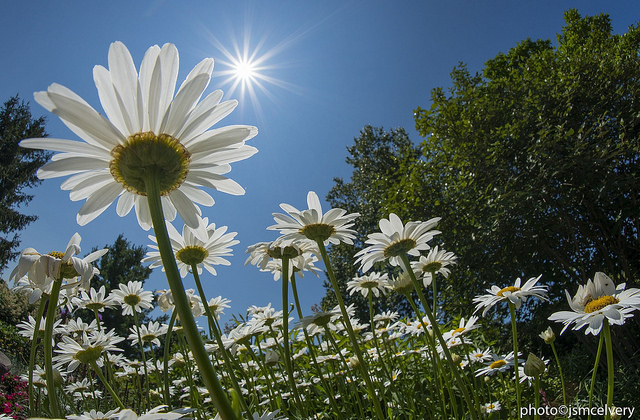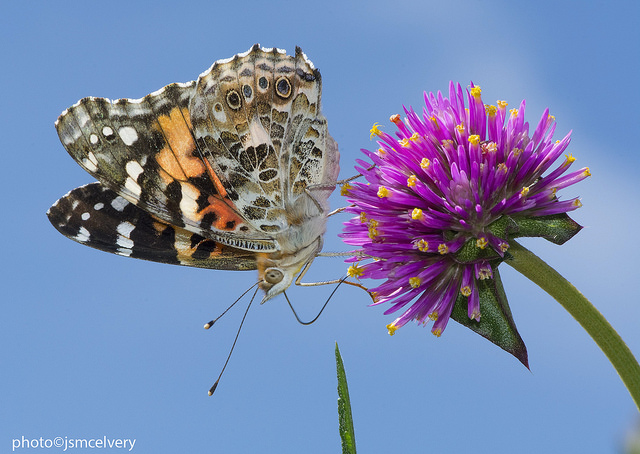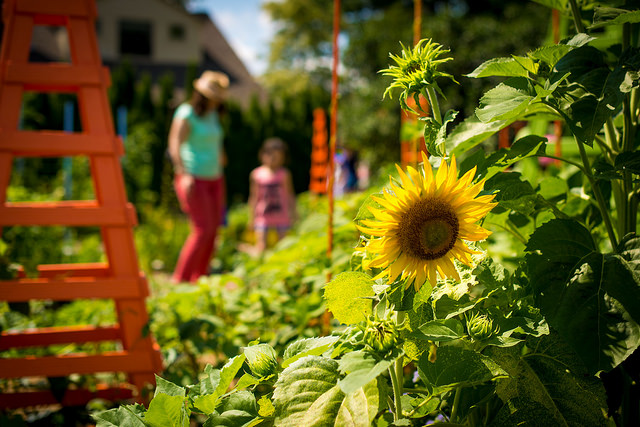Daisies at New England Botanic Garden at Tower Hill.
By Robert Burgess
New England Botanic Garden at Tower Hill Staff
We live in divisive times. You may sometimes wonder, “What difference can one gardener make?” A lot actually.
1. The act of gardening in itself helps prepare you, mentally and physically, for the challenges you face in society. It’s really hard to be angry while gardening. I find that if I know I’m going to be in a stressful spot later in the day or week, some time in the garden helps me prepare. Or if I’ve encountered something hurtful either on the news or in real life, gardening can help heal. Gardening can be its own form of meditation. Pulling weeds while breathing slowly and living in the moment, conversing with the bees, butterflies, and birds. This helps keep an even keel amid the stormy times we’re living in.
Dahlia at New England Botanic Garden at Tower Hill.
2. Gardening is making the world a more beautiful place and helps counter the ugliness we see on the evenings news. Natural beauty can be a strong antidote to anger, frustration, and hostility. Your neighbors benefit from your green thumb. They bring home their own stresses, but as they arrive home after a busy day and take their regular walk around the neighborhood, your efforts will make them smile and ease their burden at least a little.
3. Gardens can yield a healthy bounty. If you’re a fruit and vegetable gardener, you may want to share the harvest with your neighbors or your local food pantry. That fresh produce, especially if you’ve grown it chemical-free, can encourage a person to eat your healthy food, thus feeling a little bit better than processed foods would have. What can you do in reaction to today’s headlines? Share what grows in your garden.
Painted Lady at New England Botanic Garden at Tower Hill.
4. The planet’s health can be an overwhelming issue. But if you just think what’s in your control, you can make your corner of the world a better place by using organic growing methods. Your efforts will set off a domino effect as neighbors set out to replicate your successes. Over time, the collective efforts of treating your patch of earth well will compound with others. And Earth will be better for it. If climate change is too divisive an issue, we can all agree it’s important to help the creatures that call our communities home by using less chemicals in our home and yards. Let’s start there.
5. While the media, and social media, can emphasize our differences, we share more in common than we know. There’s no greater example than gardening. Gardening isn’t political. Even people who vote differently on Election Day, can talk about how their tomatoes are growing. In fact, the more we get outside – gardening, golfing, hiking, bird watching, canoeing – the more we can come together. “The earth is what we all have in common.” Wendell Berry said that. The more you talk about gardening, the more bridges you’re building, and the better off we’ll all be.
The Vegetable Garden at New England Botanic Garden at Tower Hill.
5. Joining a community garden is a fantastic way to connect with people you usually don’t have the opportunity to. There you’ll find people of all political stripes, backgrounds, ethnicities, religions. This is key for cultivating a better tomorrow: getting outside our comfort zones to grow together.
Robert Burgess is New England Botanic Garden at Tower Hill’s public relations manager and a suburban homesteader.




